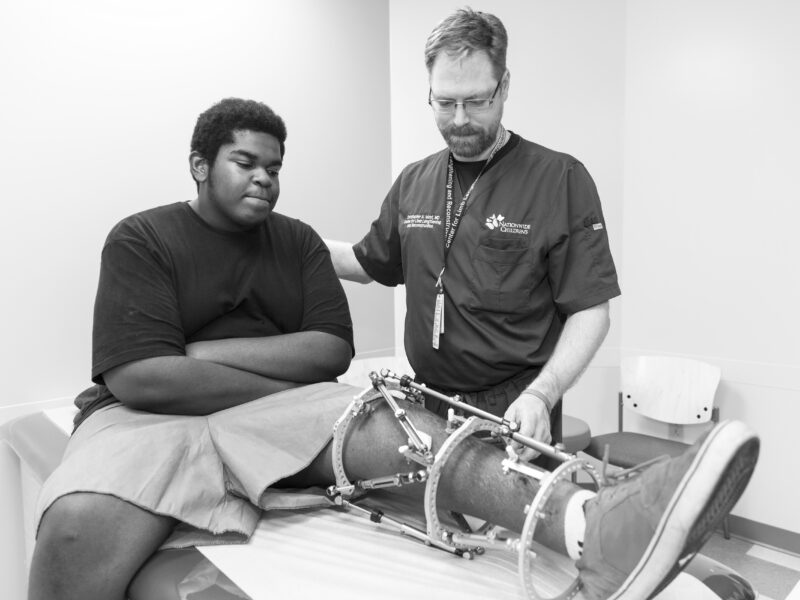First Multicenter, Prospective Study of Surgical Approach and Short-term Outcomes in Patients Undergoing Total Pancreatectomy With Islet Autotransplantation
First Multicenter, Prospective Study of Surgical Approach and Short-term Outcomes in Patients Undergoing Total Pancreatectomy With Islet Autotransplantation https://pediatricsnationwide.org/wp-content/themes/corpus/images/empty/thumbnail.jpg 150 150 Lauren Dembeck Lauren Dembeck https://pediatricsnationwide.org/wp-content/uploads/2021/03/Dembeck_headshot.gif- March 08, 2022
- Lauren Dembeck
The goal of the prospective study is to critically evaluate current clinical practices to determine which should be adopted or abandoned. It will also provide an opportunity to evaluate patients’ quality of life after total pancreatectomy with islet autotransplantation.
For children and adults with debilitating pancreatitis that fails to respond to medical and endoscopic therapies, an increasingly popular operation is total pancreatectomy with islet autotransplantation (TPIAT). TPIAT is a complex intervention and overall surgical approaches vary with the surgeon, surgical center and patient anatomy. Until recently, approaches and variations of the operation had only been reported as single-center, retrospective studies.
“We need to better understand the surgical approaches so that we can assure optimal outcomes in these patients,” says Jaimie Nathan, MD, FACS, chief of Pediatric Abdominal Transplant and Hepatopancreatobiliary Surgery at Nationwide Children’s Hospital, who is one of the world’s leading surgeons for this advanced surgery. “TPIAT is an extremely complex operation that is conducted in few institutions, particularly in children.”[/vc_column_text][/vc_column][/vc_row]
The study revealed several significant differences in approaches used during the operation between children and adults. Children more commonly underwent splenectomy (100% vs 91%), pylorus preservation (93% vs 67%), Roux-en-Y duodenojejunostomy reconstruction (92% vs 35%), and enteral feeding tube placement (93% vs 63%). The median islet equivalents, a measure adjusting the number of islets for islet size transplanted, was higher in children than adults (4577 vs 2909), and islet isolation with COBE purification, which allows the purification of large islet tissue volume through a continuous density gradient to further reduce exocrine cells, was less common in children than adults (4% vs 15%).
“To decrease the risk of the patient remaining insulin dependent after total pancreatectomy, we use a procedure to enzymatically and mechanically isolate the islets, which the surgeon can then infuse back into the patient’s liver. If the graft is successful, the islets will continue producing insulin,” explained Dr. Nathan, who is now also the Nationwide Foundation Endowed Chair in Pediatric Transplantation.
The researchers also observed significant differences in outcomes between children and adults. Compared with adults, the median length of hospital stay was longer in children (15 days vs 11 days), but children had a lower rate of 30-day readmission (13% vs 26%). The rate of portal vein thrombosis was lower in children than in adults (2% vs 10%). No mortalities occurred in the first 90 days post-TPIAT.
“These finding demonstrate the current differences in practice and approach in pediatric and adult TPIATs in the United States,” says Dr. Nathan. “The POST study was initiated in 2017 and is still ongoing. Our next goal is to look at patients’ five-year outcomes following the procedure.”
Dr. Nathan and Balamurugan Appakalai, PhD, who is among the world’s most experienced individuals at processing human pancreases for clinical islet autotransplantation and allotransplantation, joined Nationwide Children’s in September of 2021. Dr. Appakalai is a principal investigator in the Abigail Wexner Research Institute and will lead the pancreatic islet cell isolation laboratories at Nationwide Children’s. Together the two bring a unique level of expertise for TPIAT and new capabilities to the hospital’s pediatric transplantation programs.
“We are now building a state-of-the-art TPIAT program at Nationwide Children’s that will help ensure children, both locally and globally, can access this specialized care for pancreatitis,” says Dr. Nathan.
Reference
Nathan JD, Yang Y, Eaton A, Witkowski P, Wijkstrom M, Walsh M, Trikudanathan G, Singh VK, Schwarzenberg SJ, Pruett TL, Posselt A, Naziruddin B, Mokshagundam SP, Morgan K, Lara LF, Kirchner V, He J, Gardner TB, Freeman ML, Ellery K, Conwell DL, Chinnakotla S, Beilman GJ, Ahmad S, Abu-El-Haija M, Hodges JS, Bellin MD. Surgical approach and short-term outcomes in adults and children undergoing total pancreatectomy with islet autotransplantation: A report from the Prospective Observational Study of TPIAT. Pancreatology. 2022 Jan;22(1):1-8.
About the author
Lauren Dembeck, PhD, is a freelance science and medical writer based in New York City. She completed her BS in biology and BA in foreign languages at West Virginia University. Dr. Dembeck studied the genetic basis of natural variation in complex traits for her doctorate in genetics at North Carolina State University. She then conducted postdoctoral research on the formation and regulation of neuronal circuits at the Okinawa Institute of Science and Technology in Japan.
-
Lauren Dembeckhttps://pediatricsnationwide.org/author/lauren-dembeck/
-
Lauren Dembeckhttps://pediatricsnationwide.org/author/lauren-dembeck/
-
Lauren Dembeckhttps://pediatricsnationwide.org/author/lauren-dembeck/
-
Lauren Dembeckhttps://pediatricsnationwide.org/author/lauren-dembeck/January 29, 2019
- Posted In:
- Clinical Updates
- In Brief
- Research







